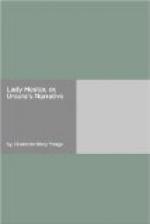Torwood thought her insane and only said quietly, as he offered my father his arm, “I will talk it over with you presently; Lord Trevorsham is not equal to discuss it now.”
“I see what you mean!” she said quickly. “You would like to make me out crazy, but Lord Trevorsham knows better. Do not you, my father?” she said, with a strong emphasis, the more marked, because it was concentrated, not loud.
My poor father was shuddering all over with involuntary trembling; but he put Torwood’s hand away from him, and looked up piteously, as if his heart was breaking (as it was); but he spoke steadily. “It is true. It is true, Torwood. I was married to poor Faith, when I was a young man, in Canada. They sent me proofs that all had perished when the Indians attacked the village; but—” and then he put his hands over his face. It must have been dreadful to see; but Hester Lea was too much bent on her rights to feel a moment’s pity; and she spoke on in a hard tone, with her eyes fixed on my brother’s face.
“But you failed to discover that she was rescued from the Indians; gave birth to me, your daughter, Hester; and only died two years ago.”
“You hear! My boy, my poor boy, forgive me; don’t leave me to her,” was what my poor father had said—he who had been so strong.
My brother saw what it all meant now. “Never fear that, sir,” he said; “I am your son still, any way, you know.”
“You will do justice to me,” she began, in her fierce tone; but my brother met it calmly with, “Certainly, we will do our best that justice should be done. You have brought proof?”
His quietness overawed her, and she pointed to the papers on the table. They were her mother’s attested narrative, and the certificate of her burial.
My brother read aloud, “The 3rd of February, 1836,” then he turned to my father and said, “You observe, father, the difference this may make, if true, is that of putting little Alured into the place I have held. My father’s last marriage was on the 15th of April, 1836,” he added to her. He says she quite glared at him with mortification, as if he had invented poor little Alured on purpose to baffle her; but my father breathed more freely.
“And is nothing—nothing to be done for my child, your own grandson?” exclaimed she, “after these years.”
Torwood silenced her by one of his looks. “We only wish to do justice,” he said. “If it be as you say, you will have a right to a great deal, and it will not be disputed; but you must be aware that a claim made in this manner requires investigation, and you can see that my father is not in a state for an exciting discussion.”
“Your father!” she said, with a bitter tone of scorn; but he took it firmly, though the blood seemed to come boiling to his temples.
“Yes,” he said, “my father! and if you are indeed his daughter, you should show some pity and filial duty, by not forcing the discussion on him while he can so little bear it.”




